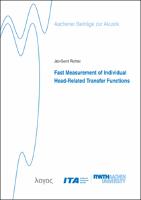Fast Measurement of Individual Head-Related Transfer Functions
Author(s)
Richter, Jan-Gerrit
Collection
Knowledge Unlatched (KU)Language
EnglishAbstract
While binaural technology applications gained in popularity in recent years, the majority of applications still use non-individual Head-Related Transfer Functions (HRTFs) from artificial heads.
However, certain applications, for example research of spatial hearing or hearing attention, require an physically exact and realistic binaural signal. The limiting factor that prohibits the widespread use of individual HRTFs is the acquisition time of such data.
This time requirement has recently been reduced by the use of parallelization in the measurement signal which lead to the development of fast measurement systems capable of acquiring individual and spatially dense HRTF.
This thesis provides a objective and subjective evaluation of such a system that is designed with the goal of little disturbance of the measurements in mind. The construction is detailed, followed by both an objective and subjective evaluation. A detailed investigation into additional distortion of the sound field introduced by the system itself is presented and it is shown that the system performs comparably to a conventional system in terms of sound source localization.
Furthermore, a method is introduced and evaluated to further reduce the measurement time by using continuous rotation during the measurement. This method is used to reduced the measurement duration from eight minutes to three minutes without audible differences.


 Download
Download